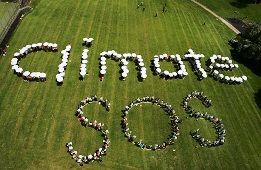 India on Friday contested a landmark UN report that said a whopping $650 billion was spent for projects aimed at adaptation and emissions reduction between 2011-2012.
India on Friday contested a landmark UN report that said a whopping $650 billion was spent for projects aimed at adaptation and emissions reduction between 2011-2012.
The report was presented at the UN Climate Convention Summit in Peru on Thursday by the UN Framework Convention on Climate Change's Standing Committee on Finance.
"Finance for climate action flowing globally stood at $650 billion annually in 2011-2012, and possibly higher," the report said.
Annual public and private flows from developed to developing countries ranged from$40 billion to $175 billion, it said.
Reacting to the UNFCCC report, India said the figure actually ranges from $340 billion to $650 billion, given gaps in data.
Rajashree Ray, Additional Economic Adviser, Ministry of Finance, told PTI in Lima that the figure includes ‘all flows from all countries’.
The range includes projects between developed countries, which would not benefit developing countries who are in need of the funds.
Ray said that even though the annual flow of funds between developed to developing countries ranged from $40 billion to $175 billion, it is misleading because ‘there is no agreed operational definition on climate finance multilaterally’ and thus what kind of project funds can be counted in that range is up for debate.
She explained that ‘in many cases here, the climate is a co-benefit and entire investment is counted as climate finance’.
Thus, development and aid projects are being double-counted as climate finance by certain developed countries or the climate financing is not a separate entity, but a subset of the country's development budget.
Both of these descriptions fall outside of the UNFCCC and Green Climate Fund goals of having new and transformational funds available to India and other developing countries for climate-related projects.
The UN also states that ‘assessing investments in adaptation is particularly difficult often because they can form part of a larger project’ but this is critical to the understanding of climate finance by developing countries and their formulation of their intentionally determined national contributions.
If there is no clear definition of what climate financing entails, developing countries may not be able to accurately gauge what climate-related projects and mechanisms they are able to undertake and include in their INDCs.
These domestic plans will form part of a comprehensive and fair 2015 Paris agreement.
On Wednesday, India told rich nations that they cannot be absolved of their past ‘sins’, and demanded that they should compensate developing nations for the effects their greenhouse gas emissions have had on climate.
India said it is ‘not equitable to talk about what a country is emitting now’ because that country could be currently reducing their emissions.
"This fact does not absolve them (rich nations) of all (past) sins," Additional Secretary in the Ministry of Environment, Susheel Kumar, who is the interim head of the Indian delegation, said.
He said India believes that developed countries should be held responsible for their high levels of emissions which have caused harm to developing countries, like itself.
That responsibility should come in the form of compensation and a fair 2015 Paris agreement.
Kumar said India's goal on adaptation during the 12-day UN climate change summit talks is for it ‘to be there in the entire text’.
"We would also like a long-term global goal for adaptation to be clearly articulated in qualitative and quantitative terms." Kumar said, adding that "for a developing country, adaptation becomes a more immediate need (than mitigation)."











 © 2025
© 2025